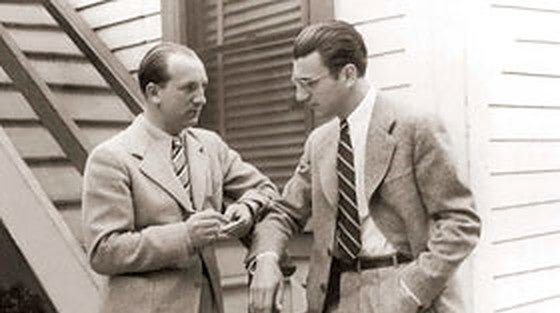
Ciro Zoppo Award Concert - The Music of Walter Jurmann and Bronislaw Kaper
The UCLA Herb Alpert School of Music presents
Ciro Zoppo Award Concert
The Music of Walter Jurmann and Bronislaw Kaper
Friday, January 19, 2024, 7pm.
Lani Hall, UCLA
Shyheim Selvan Hinnant, bass-baritone
Sam Song, tenor
Leland Smith, baritone
Shannon Delijani, mezzo-soprano
Iris Malkin, piano
Jakub Rompczyk (Ciro Zoppo Award recipient), moderation
Performers
Repertoire
Veronika, der Lenz ist da (1930)
mus. Walter Jurmann, lyr. Fritz Rotter
Shyheim Selvan Hinnant, bass-baritone
Iris Malkin, piano
Frauen brauchen immer einen Hausfreund (1930)
mus. Walter Jurmann, lyr. Fritz Rotter
Leland Smith, baritone
Ninon (1933)
from the the film “Ein Lied für dich”
mus. Bronislaw Kaper/Walter Jurmann, lyr. Ernst Marischka/Fritz Rotter
Sam Song, tenor
Cosi Cosa (1935)
from the the film “A Night in the Opera”
mus. Bronislaw Kaper/Walter Jurmann, lyr. Ned Washington
Shyheim Selvan Hinnant, bass-baritone
My Heart Is Singing (1936)
from the the film “Three Smart Girls”
mus. Bronislaw Kaper/Walter Jurmann, lyr. Gus Kahn
Shannon Delijani, mezzo-soprano
When I Look At You (1942)
mus. Walter Jurmann, lyr. Paul Francis Webster
San Francisco (1936)
from the the film “San Francisco”
mus. Bronislaw Kaper/Walter Jurmann, lyr. Gus Kahn
Program Notes
WALTER JURMANN (1903-1971)
Vienna-born Walter Jurmann's career as a composer and songwriter took him from Berlin, where he made his name in the 1920s and early '30s writing hits for Richard Tauber and others, to exile and still greater success in Paris, and finally to America by way of Hollywood beginning in early 1935. From 1932 until the end of the decade, he frequently collaborated with Bronislaw Kaper, and the two were signed to MGM at the same time. While under contract to the latter studio in the 1930s, he wrote such hits as “San Francisco” (sung by Jeanette MacDonald) for the movie of that name, and “All God's Chillun Got Rhythm” (for “A Day at the Races”), both of which were very heavily recorded by the likes of Duke Ellington or Tommy Dorsey. Jurmann later wrote songs for Deanna Durbin, and in later years he saw considerable success with his “city songs,” of which “San Francisco” had been the first; several, including that composition and one called “San Antonio,” were adopted officially by the cities that inspired them.
Stylistically, Jurmann during his Austrian/German period bridged the gap between the Viennese operetta/light classical mode of Franz Lehar and Carl Zeller and the jauntiness and brashness of the Jazz Age. His songs were among the most popular written in Germany between the late 1920s and the dawn of the Nazi era, which forced him and his writing partner Kaper to emigrate, first to Paris, where they enjoyed equal success utilizing French music influences, and then to America. He adapted well to American musical conventions and needs, and found his music sung by the likes of Ivie Anderson and Billy Eckstine, and in the repertoires of Bud Powell and other jazz greats. Jurmann retired from show business in 1946 but retained his love of music, writing for non-commercial purposes.His one attempt at a stage musical, “Windy City” (to a book by Philip Yordan and lyrics by Paul Francis Webster) was a failure before ever reaching Broadway, but not because of its score, which received high praise. He died in 1971 during his trip to Budapest, Hungary.
BRONISLAW KAPER (1902-1983)
Bronislaw Kaper was a Polish-American composer of over 150 Hollywood film scores during the mid-20th century. He was the first Polish-born composer to win an Academy Award in 1954 for scoring “Lili”. Kaper studied piano and composition at the music conservatory in Warsaw. He also studied law at Warsaw University to satisfy his father's wishes. Kaper moved to Berlin after completing his schooling in the early 1920s, which at the time contained a thriving community of actors, musicians, and artists. A few years later he became acquainted with Walter Jurmann, and they worked as a team and collaborated on several occasions. Much of their success was due to the evolving film technology, which allowed for the addition of sound and created a huge demand for both composers and performers. However, as Nazi forces gained power in Berlin, Kaper and Jurmann fled to Paris in 1933, where they continued composing film scores and songs. After two years, their talents became known by Louis B. Mayer, the co-founder of MGM studios. Mayer offered Kaper and Jurmann a seven-year contract to compose film scores in the United States, which they accepted.
The first American films that they collaborated on were “A Night at the Opera”, “San Francisco”, and “A Day at the Races”. Jurmann left the film industry after his contract with MGM expired, but Kaper continued working with the company. It was during this period when he composed music for the films “Green Dolphin Street” and “Invitation”. These themes became important jazz standards that have been recorded by countless artists, including Miles Davis, Bill Evans, and Tony Bennett. Toward the end of his contract with MGM, Kaper composed scores for “Mutiny on the Bounty”, and “Lord Jim”, which were some of his most expansive and ambitious works. In these scores he incorporated elements from foreign cultures such as Javanese Gamelan and Polynesian music. In the late 1960s Kaper transitioned to composing for TV, as pop music began replacing grandiose scores in movies. Before his retirement in 1974, he wrote the music for all 30 episodes of “Arrest and Trial”, and for “The FBI”, which ran for 219 episodes. He died from cancer in 1983 in Beverly Hills.
Special thanks to Rosemary, Adriana, and Gian Zoppo, Richard Glaser, Eva Muchnick, Marek Zebrowski, Krysta Close, UCLA Library Special Collections, the Polish Music Center at USC’s Thornton School of Music, and the AFI Louis B. Mayer Library.